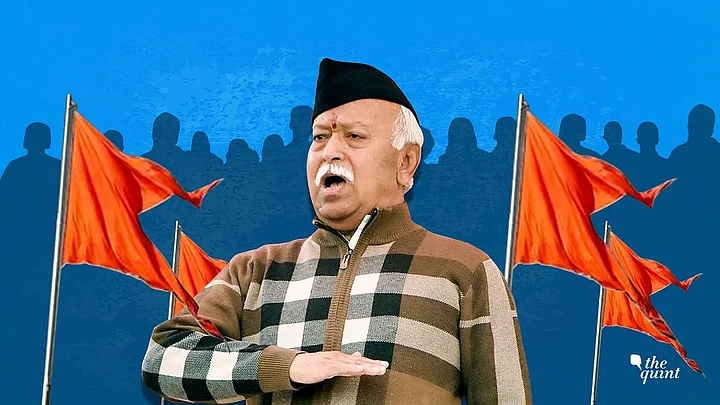"There is a gap in what they say and what they do," said Bhanwar Meghwanshi, author of the book I Could Not Be Hindu: The Story of a Dalit in the RSS, when asked about the recent remarks of Rashtriya Swayamsevak Sangh (RSS) chief Mohan Bhagwat on caste discrimination.
Bhagwat, on Sunday, 5 February, spoke against the idea of high and low in the caste system, saying we need to leave that thought behind. He was speaking at an event in Mumbai celebrating the birth anniversary of saint Ravidas, known as Sant Rohidas in Maharashtra.
"No one is high or low. What the pandits say on the basis of shashtras, is a lie. We have become deluded by getting trapped in the idea of caste superiority and caste hierarchy. This delusion must be eradicated. Our knowledge, our tradition doesn't say this and we should convey that to society."– Mohan Bhagwat
Bhagwat's comments generated sufficient interest in media and civil society because it is rare for an RSS functionary to openly acknowledge the ills of caste system. Earlier RSS chiefs, such as MS Golwalkar, have openly supported the caste system.
Distinguished scholar and author of the book Decoding the RSS, Raosaheb Kasbe, told The Quint,
"Mohan Bhagwat is a clever person. Will Bhagwat answer if Golwalkar supported the caste system? Do you then reject Golwalkar? Lower castes have now become more assertive. They are questioning the system. Why are we deemed as Shudras? Why do your texts like Manusmriti and Ramcharitmanas say insulting things about us? Bhagwat's rhetoric is part of the strategy to calm down women, Dalits, Shudras, Adivasis, and OBCs."
Kasbe further questioned why all RSS chiefs, except one, have been Brahmins, especially Chitpavan Brahmins. Will the next chief be a non-Brahmin? he asked.
"There is nothing new in saying caste discrimination is bad. But what are you going to do to change the situation? Bhagwat's remarks are a strategy to distract people from the unrest around Ramcharitmanas," Meghwanshi said.
RSS and Samrasata
Bhagwat in his address stressed on the dignity of work. He stated that no work is lowly, and that all work should be looked at with equal respect and dignity. He gave the example of Sant Ravidas, and said that Ravidas approached his hereditary occupation of cobbler as selfless service to society.
"Sant Ravidas had a good hereditary trade. But while doing that business, he didn't worry about income. What does having our own livelihood mean? It is service to the people. Society needs that service and hence we manage to earn. You take the example of a big corporate house or someone working on the street. Society needs their work and hence they manage to keep doing what they do. They get their livelihood in return. It's not a contract, it's their dharma."– Mohan Bhagwat
Meghwanshi said that RSS' samrasata means status quo.
"RSS wants that the society should stay the way it is. Whatever your place is on the varna/caste ladder, you should stay there. Whatever hereditary occupation you are doing, you should keep doing it. Alongside, you should get integrated into the Hindu identity," he stated.
Phule-Ambedkarite activist and scholar Dhammasangini Ramagorakh told The Quint that it is not new for RSS to talk about caste harmony. They don't question caste-based division of work, only say that no one should be looked at as high or low due to their occupation.
"The Phule-Ambedkarite thought insists on redistribution of resources and power. RSS doesn't talk about it at all," she said.
She also questioned the Phule-Ambedkarites who say RSS should burn Manusmriti or appoint a non-Brahmin as its chief.
"They already say Manusmriti is dated. They may even burn it tomorrow. They can also appoint a non-Brahmin as RSS chief. But are they going to change their ideology? Are they going to stop imposing their Hindutva on others?"– Dhammasangini Ramagorakh
She further said that Sangh Parivar's outreach towards marginal sections of society is part of its dual strategy of attracting them towards Brahmanic Hinduism as well as to reap electoral benefits.
Kasbe told The Quint that the Chamar community is spread across India and is one of the largest caste groups in the country and therefore the Sangh Parivar is reaching out to them for political gains.
